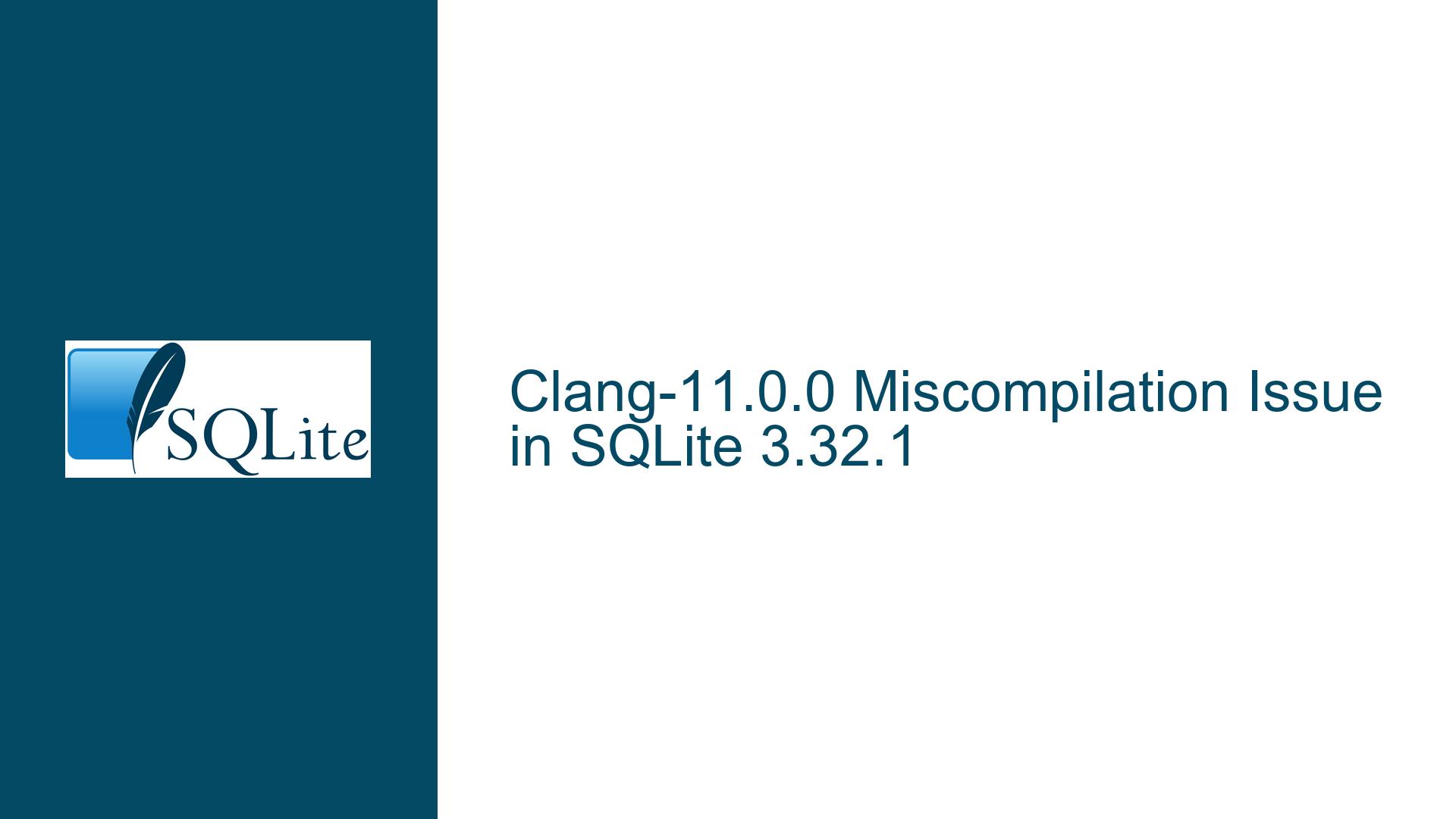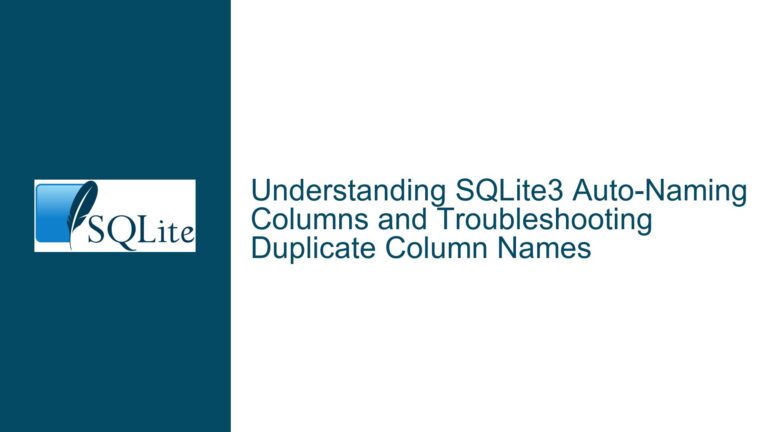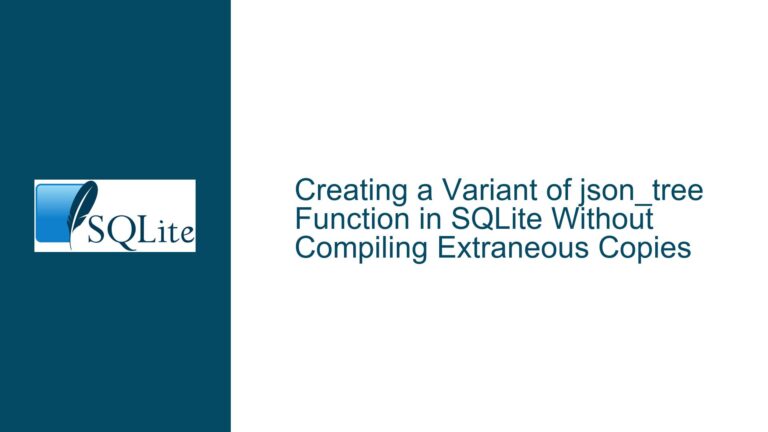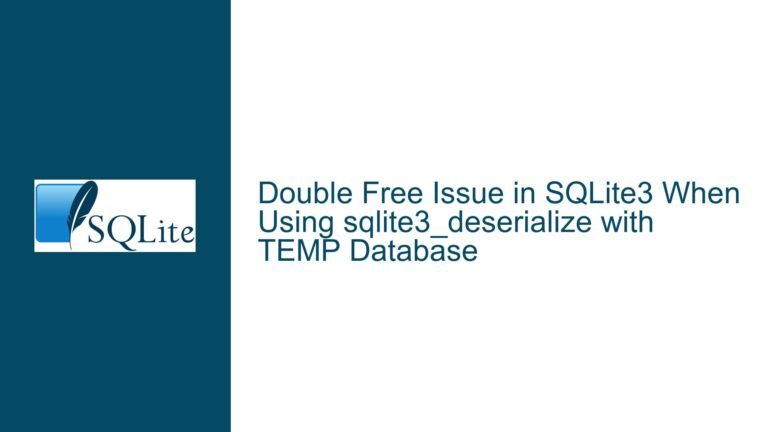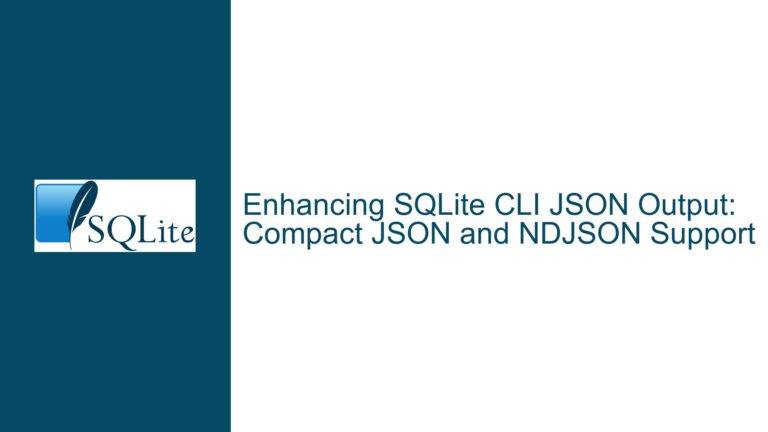Clang-11.0.0 Miscompilation Issue in SQLite 3.32.1
Miscompilation of SQLite 3.32.1 by Clang-11.0.0
The core issue revolves around the miscompilation of SQLite version 3.32.1 when using the Clang-11.0.0 compiler. This miscompilation manifests in the utf.c source file, specifically in lines 345-347, where the compiler incorrectly assumes that the sqlite3VdbeMemRelease() function does not alter the value of pMem->flags. This assumption leads to incorrect bit manipulation, resulting in a corrupted state of the pMem->flags variable. The miscompilation was initially identified through OSSFuzz bug reports and was later confirmed by the SQLite development team. The issue is particularly concerning because it affects the integrity of SQLite’s internal memory management, which is critical for the correct execution of database operations.
The miscompilation occurs due to Clang-11.0.0’s optimization behavior, which incorrectly reorders the instructions in a way that assumes the sqlite3VdbeMemRelease() function does not modify pMem->flags. This assumption is incorrect, as the function does indeed modify pMem->flags, leading to a discrepancy between the expected and actual behavior of the code. The issue was exacerbated by the fact that the compiler in question was a pre-release version, which may have contained unresolved bugs or incomplete optimizations.
The SQLite development team has provided a workaround by reordering the bit manipulation operations to occur before the sqlite3VdbeMemRelease() function call. This workaround ensures that the correct value of pMem->flags is preserved, even if the compiler incorrectly reorders the instructions. However, this workaround is not a permanent solution, and developers are advised to exercise caution when using Clang-11.0.0 with SQLite 3.32.1.
Incorrect Instruction Reordering by Clang-11.0.0
The root cause of the miscompilation issue lies in the Clang-11.0.0 compiler’s optimization behavior. Specifically, the compiler incorrectly reorders the instructions in a way that assumes the sqlite3VdbeMemRelease() function does not modify the pMem->flags variable. This assumption is incorrect, as the function does indeed modify pMem->flags, leading to a corrupted state of the variable.
The miscompilation is particularly problematic because it affects the integrity of SQLite’s internal memory management. The pMem->flags variable is used to store various flags that control the behavior of memory management operations. If this variable is corrupted, it can lead to incorrect memory management, which can result in a wide range of issues, including memory leaks, data corruption, and even application crashes.
The issue was initially identified through OSSFuzz bug reports, which highlighted the miscompilation as a potential source of bugs in SQLite. The SQLite development team was able to reproduce the issue by following the OSSFuzz bug replication procedures, which involved using the same compiler and build settings as those used by OSSFuzz. This allowed the team to confirm that the issue was indeed caused by the Clang-11.0.0 compiler.
The SQLite development team has provided a workaround by reordering the bit manipulation operations to occur before the sqlite3VdbeMemRelease() function call. This workaround ensures that the correct value of pMem->flags is preserved, even if the compiler incorrectly reorders the instructions. However, this workaround is not a permanent solution, and developers are advised to exercise caution when using Clang-11.0.0 with SQLite 3.32.1.
Workaround and Best Practices for Using Clang-11.0.0 with SQLite
Given the miscompilation issue caused by Clang-11.0.0, developers are advised to take several precautions when using this compiler with SQLite 3.32.1. The primary workaround provided by the SQLite development team involves reordering the bit manipulation operations to occur before the sqlite3VdbeMemRelease() function call. This ensures that the correct value of pMem->flags is preserved, even if the compiler incorrectly reorders the instructions.
To implement this workaround, developers should modify the affected code in the utf.c source file as follows:
c = MEM_Str|MEM_Term|(pMem->flags&(MEM_AffMask|MEM_Subtype));
sqlite3VdbeMemRelease(pMem);
pMem->flags = c;
This modification ensures that the bit manipulation operations are performed before the sqlite3VdbeMemRelease() function call, thereby preserving the correct value of pMem->flags.
In addition to implementing the workaround, developers should also consider the following best practices when using Clang-11.0.0 with SQLite:
Avoid Using Pre-Release Compilers: The Clang-11.0.0 compiler in question was a pre-release version, which may have contained unresolved bugs or incomplete optimizations. Developers should avoid using pre-release compilers in production environments and instead opt for stable, well-tested versions.
Thoroughly Test Applications: Developers should thoroughly test their applications when using Clang-11.0.0 with SQLite 3.32.1. This includes running extensive unit tests, integration tests, and stress tests to ensure that the application behaves correctly under various conditions.
Monitor for Compiler Updates: The LLVM development team has already identified the issue and is working on a fix. Developers should monitor for updates to the Clang compiler and apply them as soon as they become available. This will help ensure that any issues caused by the miscompilation are resolved.
Consider Alternative Compilers: If the miscompilation issue poses a significant risk to the application, developers may consider using an alternative compiler, such as GCC, until the issue is resolved. GCC is a well-established compiler that is widely used in the development of SQLite and other critical software.
Enable Compiler Sanitizers: Developers should enable compiler sanitizers, such as AddressSanitizer and UndefinedBehaviorSanitizer, to detect potential issues caused by the miscompilation. These sanitizers can help identify memory corruption, undefined behavior, and other issues that may arise due to incorrect compiler optimizations.
By following these best practices, developers can mitigate the risks associated with the Clang-11.0.0 miscompilation issue and ensure the stability and reliability of their SQLite-based applications.
Conclusion
The miscompilation of SQLite 3.32.1 by Clang-11.0.0 is a critical issue that can lead to incorrect memory management and potential data corruption. The issue arises due to the compiler’s incorrect assumption that the sqlite3VdbeMemRelease() function does not modify the pMem->flags variable, leading to incorrect bit manipulation. The SQLite development team has provided a workaround by reordering the bit manipulation operations to occur before the function call, but developers are advised to exercise caution when using Clang-11.0.0 with SQLite 3.32.1.
To mitigate the risks associated with this issue, developers should avoid using pre-release compilers, thoroughly test their applications, monitor for compiler updates, consider alternative compilers, and enable compiler sanitizers. By following these best practices, developers can ensure the stability and reliability of their SQLite-based applications and avoid potential issues caused by the miscompilation.
In summary, while the Clang-11.0.0 miscompilation issue poses a significant challenge, it can be effectively managed through careful implementation of the provided workaround and adherence to best practices. Developers should remain vigilant and proactive in addressing this issue to ensure the continued success of their SQLite-based projects.
